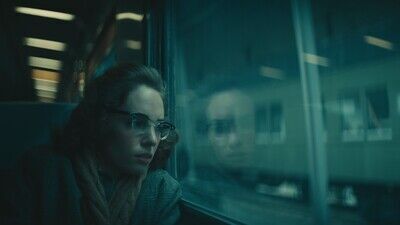I read an interview a while back, or it might have been a video interview, where you said that Thomas Merton helped you realize you could be a writer and an actor. Do you …
It’s funny to talk with somebody who’s actually paid attention.
Do you write every day? Is that something that you practice?
No. I really feel that the problem with being an actor is that you’re only as good as your opportunities. You have a chance to be in a rehearsal room at Steppenwolf with Sam Shepard, then there’s nowhere else you really want to be. Working with Linkletter or rehearsing a play with Tom Stoppard, there’s nowhere else you want to be. The problem is, a lot of times in the life of a professional actor, there are other places you’d like to be. And from a very young age, I sniffed that out and wanted to take some responsibility for my own art. I was really worried about the life of an actor, about how fickle it is. And, it’s comic what I’m about to tell you. I went to the Abbey of Gethsemani on retreat with Steve Zahn, actually, and had a total crisis of character. I said, “I don’t want to be an actor. This is all fake and all ridiculous. I want to be Thomas Merton.” And Steve, in his absolute wisdom replied, “You don’t get to decide that. You’re you.” Thomas Merton couldn’t figure out if you wanted to be a writer or a monk, and what he ended up being was a wonderful monastic writer. I started realizing that there wasn’t a choice that had to be made. That there was the illusion of choice. What’s comic to me about this story is when I was location scouting for “Wildcat,” I was there with Steve Zahn and realized that we were about 100 yards from Gethsemani Abbey. I felt the universe was speaking to me in some strange way. Does that make sense? Thomas Merton, his journals were really helpful about this idea that we get told that we have to pick a personality, pick a lane, pick a brand, pick a thing, and you just don’t have to.
I really loved the interview you did for Criterion last summer with Vincent D’Onofrio about the Method. That conversation was really fascinating, and while I was watching “Wildcat,” I couldn’t help but think that the project you were working on the last time we talked was “The Last Movie Stars” about Paul Newman and Joanne Woodward. I finally watched “The Stripper” and the trailer at the beginning of “Wildcat” feels like it could be for “The Stripper.” Is that what you were riffing on?
I was trying to do something punk. You know, there’s something so mischievous about Flannery O’Connor’s writing, and I thought that if somebody did a normal cradle to grave biography or an after school special of Flannery, that they should be put in jail. So I wanted to do something that might knock the audience off balance, and make them say, “Wait, I’m not sure where I am.” And I had just been working, you know, re-editing “The Stripper” and it was in my head about the fraudulence of making movies to begin with. There’s something I did when I was younger, some Brecht plays, and Brecht really loved to try to remind the audience that they were in a theater, so they would wake up. Because there’s this idea that we’re supposed to be this hypnosis where your life stops, and you don’t have to be you. We’re just going to put you to sleep like an opiate. Brecht really wanted to engage with you. And I thought wow, that’s what Flannery is doing. She’s so abrasive. So all that was in my mind for sure. I mean, what Maya is doing is a full blown, I mean, that Star Drake is a riff on that for sure.
I think there’s a coat in the opening sequence that’s almost the exact same coat Joanne wears in the film.
It is almost the exact same coat. One of the things because, you know, Maya is also my daughter and my friend, and I found while working on the documentary, Joanne Woodward’s ability to shape change, she’s almost unrecognizable from part to part without trying very hard. I was showing Maya that in regards to these different characters that she was gonna play. That you can shape change in extremely subtle ways, so it doesn’t feel like a stunt. With Joanne;s performances it never never felt like the movie was all about the wig or was all about the makeup job or the costumes. It always seems like “That one’s her! No, that one’s he!” They all seem like they’re really her. That was the challenge for Maya, to channel that. Laura Linney was a great key for that, because Laura Linney is my generation’s Joanne.

